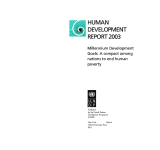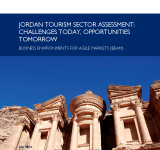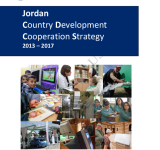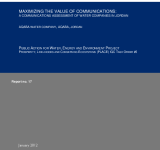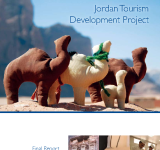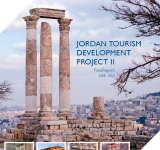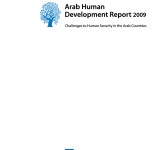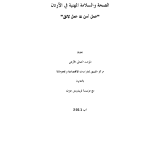This report provides an assessment of the Millennium Development Goals;; laid out by the UN Millennium Declaration. The UN Millennium Declaration was adopted in September of 2000 as a commitment on the part of the world's leading nations to reduce poverty;; improve health and promote peace;; human rights;; and environmental sustainability. The Millennium Development Goals are specific;; measurable targets that aim to reduce extreme global poverty by the year 2015. This report analyzes the challenges and barriers to meeting these goals as of 2003;; examining the successes and failures of various nations and the gaps that exist between regions and countries with regards to economic growth and human development. This report then examines the successes and failures of public and private policies with regards to hunger;; health;; water and sanitation;; education;; and environmental sustainability. This report also analyzes the participation of civil society throughout the world and the mobilization of grassroots support for the various human development goals. Finally;; this report presents a number of recommendations on what countries can do to best support these goals.
business
The tourism sector assessment report examines critical questions related to Jordan's best opportunity areas for tourism development growth that will result in increasing tourism receipts;; private-sector investment in tourism;; and tourism-related employment. The report identifies global trends;; best practices;; and benchmarks shaping tourism demand and competitiveness. It also suggests approaches for expanding tourism in key Jordan governorates and secondary destination in ways that benefit local communities. According to the assessment;; Jordan is well-positioned to move from a regional;; multi-country tourist destination to a stand-alone destination with a portfolio of tourism products with year-round appeal for foreign and domestic visitors;; and this will require a long-term commitment from both public and private stakeholders. It suggests collaboration between Jordan's government and private sector;; localized and inclusive economic development implementation strategies and increase in the supply of skilled tourism workforce professionals.
Defining the goal as improved prosperity;; accountability and equality for a stable;; democratic Jordan;; the strategy report highlights a long-standing partnership between Jordan and the United States. Amidst a number of challenges;; Jordan continues to play a strategic ally in the region and therefore;; the report stresses the importance of assisting Jordan in carrying out its stated commitment to broad-based political and economic reforms. The three development objectives are 1. Broad-based;; inclusive economic development accelerated;; 2. Democratic accountability strengthened;; and 3. Essential services to the public improved;; with a special development objective of gender equality and female empowerment enhanced. According to the report;; the key theme of the strategy is complementing support for Jordanian-led structural reform with grassroots activities of more visible and more directly “felt” people-level impact. The development objectives find specific areas of focus that need the USAID investments and support.
The report is based on the study designed to conduct a communications assessment of Aqaba Water Company;; one of the key water utilities in Jordan and to examine how its communications department collaborates with other areas of the organization. As part of the Public Action for Water;; Energy and Environment Project (PAP);; a public education and behavior change communication program developed to support USAID’s technical and policy investments in the Jordanian water and energy sectors;; the report finds that the effective communications can save the utility money by improving operations;; increasing efficiencies and reducing customer complaints. The report suggests that the strategic communications can be the key to a sustainable future for the kingdom during the times of critical resource constraints and presents some guiding principles and recommendations for the Aqaba Water Company’s communication efforts.
The final report is the product of the Jordan Tourism Development Project;; which is a three-year project that operated from August 2005 to August 2008. The Project worked closely with government stakeholders;; particularly the Ministry of Tourism and Antiquities and Department of Antiquities;; along with the private sector;; local communities and the tourism industry to help develop Jordan's tourism industry. As part of the project;; the USAID/Jordan's primary aim was to develop Jordan's key tourism institutions and improve the institutional environment to better facilitate tourism development. The project also worked to change perceptions of the industry through a nationwide campaign that entailed workshops;; training sessions and delivering key messages by distributing brochures;; flyers and posters. According to the report;; the work of the USAID/ Jordan Tourism Development Project has created strong momentum among the government and private sectors;; as well as communities;; for positive development of tourism in Jordan;; leaving much scope for further development of the country's tourism sector to bring Jordan closer to operating a full-fledged tourism industry that attracts increasing numbers of tourists and effectively meets their growing demands. The report also finds several areas that still need improvement such as the awareness of the importance of tourism to Jordan;; marketing and recruitment for tourism institutions and standards of tourism accommodation.
The USAID Jordan Tourism Development Project is the largest dedicated tourism development project implemented by the United States Agency for International Development. The final report for the project phase of 2008-2013 shares success stories of developing Jordan's tourism sector and increasing the number of visitors to the country according to the updated national strategy for the current period with new targets and implementation of actions. The report highlights the projects' achievements in supporting archaeological conservation of key sites such as Petra;; Madaba and Amman Citadel and improving the visitor experience in Jordan through an extenstive nationwide training program. The final report also includes the stories of those who benefitted from USAID's investment in tourism and the USAID tourism project's comprehensive sustainable tourism industry development approach.
The fifth volume in the series of Arab Human Development Reports sponsored by the United Nations Development Programme and independently authored by intellectuals and scholars from Arab countries. The report argues that human security is a prerequisite for human development;; and that the widespread absence of human security in Arab countries undermines people's options.
يهدف هذا التقرير إلى تقديم قراءة تقييمية لواقع الصحة والسلامة المهنية في بيئة الأعمال الأردنية;; تتضمن قراءة في التشريعات الأردنية الخاصة بالصحة والسلامة المهنية;; إلى جانب استعراض لأبرز المعايير الدولية ذات العلاقة;; إضافة إلى تقديم قراءة لمدى موائمة التشريعات الأردنية مع المعايير الدولية في هذا المجال;; كما اعتمد التقرير في منهجيته على تحليل البيانات الاحصائية المتاحة حول الصحة والسلامة المهنية واصابات العمل;; وكما تم اجراء مقابلات مع بعض رؤساء النقابات العمالية;; وذلك إلى جانب مراجعة المعلومات والأخبار الصحية التي تناولت هذا الموضوع. ويقدم التقرير مجموعة من التوصيات التي من شأنها تحسين شروط الصحة والسلامة المهنية للعاملين في الأردن.
